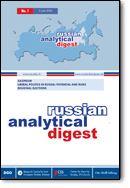Nr. 139: Governors and Mayors

Autor(en): David Lane, J. Paul Goode, Joel Moses, Colin Reisser
Herausgeber: Stephen Aris, Matthias Neumann, Robert Orttung, Jeronim Perovic, Heiko Pleines, Hans-Henning Schröder, Aglaya Snetkov
Serie: Russian Analytical Digest (RAD)
Ausgabe: 139
Verlag(e): Center for Security Studies (CSS), ETH Zurich; Research Centre for East European Studies, University of Bremen; Institute for European, Russian and Eurasian Studies, George Washington University
Publikationsjahr: 2013
